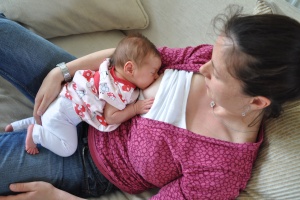What are the benefits of breastfeeding? Find out more about breastfeeding and how to seek support if you need it.
1. You know when a friend makes you a cup of coffee exactly how you like it? Breast milk is like that for your baby. It changes over time to make sure it’s just right (Victora et al, 2016; NHS, 2017).
2. Breast milk can help to reduce the risk of your baby getting infections and diseases by breastfeeding (NHS, 2017).
3. Breastfeeding can be really handy and you can do it anywhere (NHS, 2017).
4. Breastfeeding is a way of bonding with your baby - giving you time together (NHS, 2017).
5. Breastmilk fact: breast milk is a bioactive fluid (Martin et al, 2016). It contains proteins, fats, vitamins and minerals plus antibodies to fight germs. It also contains hormones that help your baby’s development (Victora et al, 2016).
6. If you can breastfeed your baby, they have a lower risk of ear, respiratory and gastro-intestinal infections and diarrhoea (Victora et al, 2016; Bowatte et al, 2015). Meaning a healthier baby and fewer trips to the hospital for you both (NHS, 2017).
7. Breastfeeding reduces the risk of sudden infant death syndrome (Victora et al, 2016).
8. Premature babies who can drink their mum’s breastmilk have a lower risk of necrotising enterocolitis (Colaizy et al, 2016; NHS 2016), a potentially dangerous bowel disorder.
9. It’s not all about the baby: breastfeeding reduces your risk of obesity and of type 2 diabetes (Horta et al, 2015; Victora et al, 2016).
10. Major plus: fewer children who had breastmilk as babies develop childhood leukemia.
11. Random one but babies who receive breastmilk have a lower risk of dental malocclusions. This is where the upper teeth bite over the lower ones (and in some cases the jaw too), it can cause tooth decay (Victora et al, 2016).
12. Breastfeeding may reduce the risk of childhood asthma and allergic rhinitis, an inflammation inside the nose caused by allergens (Lodge et al, 2015).
13. Breastfeeding could help your baby enjoy more foods. The flavour of breastmilk changes, while formula remains constant so by the time it comes to weaning, your baby could be more used to different flavours.
14. When your six month plus baby is ill, they might be comforted by a breastfeed, which then means they’ll probably recover more quickly.
15. You can battle food allergies with breastfeeding. Continuing to breastfeed your baby after they’ve started solids may protect them from being allergic to certain foods (Baby Centre 2017).
16. If your baby gets a cold, you'll then get the cold virus from them but your immune system will make antibodies to fight the virus. Then through your milk, those antibodies will help your baby fight the infection themselves (Baby Centre 2017).
17. Breastfeeding is free. Let’s not underestimate the importance of this one.
18. Breastmilk contains long-chain polyunsaturated fatty acids. They help your baby’s all-important brain to develop (Baby Centre 2017).
19. Your own risk of ovarian or breast cancer reduces if you can breastfeed your baby (Victora et al, 2016; NHS, 2017).
20. While there’s no evidence breastfeeding will help you shed weight anywhere else, it will help your uterus return to its normal size.
21. Breastfeeding reduces the risk of your baby wheezing and developing severe eczema (Baby Centre 2017).
22. Mums who can breastfeed won’t see the return of their periods quite so soon. This can be handy as it may assist with birth spacing (Victora et al, 2016).
23. With no packaging or plastic, breastfeeding doesn't have an impact on the environment (Kent, 2015).
Further information
NCT supports all parents, however they feed their baby. If you have questions, concerns or need support, you can speak to a breastfeeding counsellor by calling our support line on 0300 330 0700, whether you are exclusively breastfeeding or using formula milk. Breastfeeding counsellors have had extensive training, will listen without judging or criticising and will offer relevant information and suggestions. You can also find more useful articles here.
Our support line offers practical and emotional support in many areas of pregnancy, birth and early parenthood: 0300 330 0700.
You might find attending one of our NCT New Baby courses helpful as they give you the opportunity to explore different approaches to important parenting issues with a qualified group leader and other new parents in your area.
Make friends with other parents-to-be and new parents in your local area for support and friendship by seeing what NCT activities are happening nearby.
National Breastfeeding Line (government funded): 0300 100 021.
Bowatte, G. et al (2015). Breastfeeding and childhood acute otitis media: a systematic review and meta-analysis. Acta Paediatrica, Special Issue: Impact of Breastfeeding on Maternal and Child Health. Volume 104, Issue Supplement S467, pages 85-95
Chowdhury, R. et al (2015). Breastfeeding and maternal health outcomes: a systematic review and meta-analysis. Acta Paediatrica, Special Issue: Impact of Breastfeeding on Maternal and Child Health. Volume 104, Issue Supplement S467, pages 96-113.
Colaizy, T, et al (2016), Impact of optimised breastfeeding on the costs of necrotizing enterocolitis in extremely low birthweight infants, Journal of Pediatrics, doi: 10.1016/j.jpeds.2016.03.040
GOSH (Great Ormond Street Hospital for Children NHS Foundation Trust) (2016) Necrotising enterocolitis. Available at: https://www.gosh.nhs.uk/medical-information/search-medical-conditions/necrotising-enterocolitis
Horta, B.L. et al (2015). Long-term consequences of breastfeeding on cholesterol, obesity, systolic blood pressure and type 2 diabetes: a systematic review and meta-analysis. Acta Paediatrica, Special Issue: Impact of Breastfeeding on Maternal and Child Health. Volume 104, Issue Supplement S467, pages 30-37.
Kent, G. (2015). Global infant formula: monitoring and regulating the impacts to protect human health. International Breastfeeding Journal, 10, 6. http://doi.org/10.1186/s13006-014-0020-7. Available at: https://www.ncbi.nlm.nih.gov/pmc/articles/PMC4362817/
Kramer MS, Kakuma R. (2012) Optimal duration of exclusive breastfeeding. Cochrane Database of Systematic Reviews, Issue 8. Art. No.: CD003517. DOI: 10.1002/14651858.CD003517.pub2. Available at: http://www.cochrane.org/CD003517/PREG_optimal-duration-of-exclusive-breastfeeding
Lodge, C.J. et al (2015) Breastfeeding and asthma and allergies: a systematic review and meta-analysis. Acta Paediatrica, Special Issue: Impact of Breastfeeding on Maternal and Child Health. Volume 104, Issue Supplement S467, pages 38-53.
Martin, C. R., Ling, P.-R., & Blackburn, G. L. (2016). Review of Infant Feeding: Key Features of Breast Milk and Infant Formula. Nutrients, 8(5), 279. http://doi.org/10.3390/nu8050279.
NHS (2017a) Benefits of breastfeeding. Available at: http://www.nhs.uk/Conditions/pregnancy-and-baby/Pages/benefits-breastfeeding.aspx
NHS (2017b) Premature labour and birth. Available at: https://www.nhs.uk/conditions/pregnancy-and-baby/premature-early-labour/
Peters, s et al (2017) Breastfeeding and the Risk of Maternal Cardiovascular Disease: A Prospective Study of 300 000 Chinese Women. Journal of the American Heart Association. Available at: http://jaha.ahajournals.org/content/6/6/e006081
Sankar, M. J. et al (2015). Optimal breastfeeding practices and infant and child mortality: a systematic review and meta-analysis. Acta Paediatrica, Special Issue: Impact of Breastfeeding on Maternal and Child Health. Volume 104, Issue Supplement S467, pages 3–13
Victora, Cesar G et al (2016) Breastfeeding in the 21st century: epidemiology, mechanisms, and lifelong effect. The Lancet, Volume 387 , Issue 10017 , 475 – 490. Available at: http://www.thelancet.com/journals/lancet/article/PIIS0140-6736(15)01024-7/fulltext
World Health Organisation (WHO) (2017) Breastfeeding. Available at: http://www.who.int/topics/breastfeeding/en/







